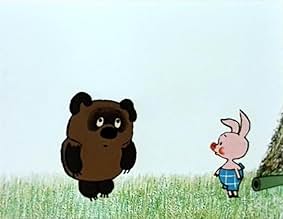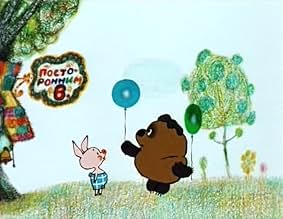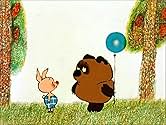IMDb-BEWERTUNG
8,2/10
5156
IHRE BEWERTUNG
Füge eine Handlung in deiner Sprache hinzuA Soviet version of Winnie-the-Pooh. His first adventure is a desperate attempt to get to honey in a bee hollow. He is ready to take decisive action.A Soviet version of Winnie-the-Pooh. His first adventure is a desperate attempt to get to honey in a bee hollow. He is ready to take decisive action.A Soviet version of Winnie-the-Pooh. His first adventure is a desperate attempt to get to honey in a bee hollow. He is ready to take decisive action.
- Regie
- Drehbuch
- Hauptbesetzung
Evgeniy Leonov
- Vinni-Pukh
- (Synchronisation)
- (as E. Leonov)
Iya Savvina
- Pyatachok
- (Synchronisation)
- (as I. Savvina)
Vladimir Osenev
- Narrator
- (Synchronisation)
- (as V. Osenev)
Empfohlene Bewertungen
Animators in the Soviet Union never really cared about copyright. Their work was typically destined to be released only in their own country, and so there seemed little reason to bother with gaining permission from the likes of Dr. Seuss {as in Alexei Karaev's 'Welcome (1966)'} or A.A. Milne. Fyodor Khitruk's series of animated Winnie the Pooh adaptations was not the first, Wolfgang Reitherman at Disney having already directed two shorts several years earlier, but they are nonetheless well-remembered by Russians who grew up watching the cartoons on television. With a cheeky, down-to-earth charm that appeals to both children and adults, the series beginning with 'Vinnie-Pukh (1969)' has since developed something of a cult following, and are considered by many to decisively surpass their Disney counterparts, however uneasily they may fit into the official canon. The animation itself is somewhat coarse and minimalistic, but this all adds to the charm of it all, with the story and characters coming to life as though they have just stepped out of a picture-book.
The first film runs just 11 minutes in length, and follows the efforts of Winnie and Piglet to steal precious honey from a hive of fiercely territorial bees. Demonstrating a keen sense of creativity, Winnie decides to borrow a blue balloon from Piglet's home, the idea being that, after the balloon carries him to the top of the oak tree, the bees will mistake the balloon for a piece of sky, and Winnie for a darkened rain cloud. It was a good idea in theory. One doesn't usually associate Winnie the Pooh with intelligence, but the Russian version does exhibit a sharp sense of wit, and Evgeni Leonov brings a wonderful amount of humour and character to his voice-acting. Piglet (or Pyatachok, voiced by actress Iya Savvina) is placed cute and innocent, enthusiastically submitting to Winnie's every command, and occasionally lamenting at the loss of his beloved blue balloon. For fans of Soviet animation, or animation in general, 'Vinnie-Pukh' is a charming and witty moving storybook.
The first film runs just 11 minutes in length, and follows the efforts of Winnie and Piglet to steal precious honey from a hive of fiercely territorial bees. Demonstrating a keen sense of creativity, Winnie decides to borrow a blue balloon from Piglet's home, the idea being that, after the balloon carries him to the top of the oak tree, the bees will mistake the balloon for a piece of sky, and Winnie for a darkened rain cloud. It was a good idea in theory. One doesn't usually associate Winnie the Pooh with intelligence, but the Russian version does exhibit a sharp sense of wit, and Evgeni Leonov brings a wonderful amount of humour and character to his voice-acting. Piglet (or Pyatachok, voiced by actress Iya Savvina) is placed cute and innocent, enthusiastically submitting to Winnie's every command, and occasionally lamenting at the loss of his beloved blue balloon. For fans of Soviet animation, or animation in general, 'Vinnie-Pukh' is a charming and witty moving storybook.
Unless you've read any of A.A. Milne's original works, then your image of Winnie the Pooh is the treacly cartoons released by Disney. But there was another set of cartoons depicting the honey-obsessed bear. This set got produced by Soyuzmultfilm, a studio in the Soviet Union, and their Pooh looks more ursine than the Disney one. The first one was "Vinni-Pukh" (the Russian pronunciation of the bear's name). In this one, Pooh wants to get some honey out of a beehive, and so he enlists Piglet's help (Piglet is called Pyatachok in Russian). Naturally there are a few snags. I particularly liked Pooh's nonsense singing. This particular cartoon doesn't include the rest of the characters. It's all about Pooh, Piglet, and the bees. Anyone interested in the history of animation can't afford to miss this short.
Put aside the character we Americans are used to and you give permission to enjoy the story. It's the classic Winnie, given a Russian sense. As usual, he lives his life to ingest as much honey as he can lay his paws on. Obviously, it is the Milne character with all the subordinating cast.
I don't mean to generalize, but if you really want to get some sense of the difference between Russian and American animation (with many many exceptions, obviously), just compare this phenomenal Vinni Pukh with the wretched Disney Winnie the Pooh. The Disney one is sentimental, pandering, unsophisticated, and dumb. Winnie himself lethargically stumbles along like a middle-aged man with a developmental disability. Vinni, however, is vigorous, adventurous, and witty. He's sly and he has attitude. He is no longer a disposable "silly old bear," he is a worthy protagonist. Pyatachok is not a pathetic, feathery-voiced ball of pink. He is vibrant and fun, and their friendship, so beautifully rendered by Milne and made sappy and idiotic by Disney, is here authentic and moving once again. Soviet animation at its best.
This series of cartoons is loosely based on the A. A. Milne's story of Winnie-the-Pooh as brilliantly retold (rather than simply translated into Russian) by Boris Zakhoder. The scriptwriters created three 15-minute masterpieces by discarding all the boring and irrelevant characters (most notably Christopher Robin, Tigger, Kanga and Roo) and beefing them up with original graphics (sooo superior to Disney's!), wacky songs and hilarious jokes. Quotes from the Vinni Pukh cartoons and humor based on them (much of it R-rated or worse) have become deeply ingrained into the culture of Russian-speaking people - probably even more than the Star Trek's "Scotty, beam me up!" in the United States. A must-see for any foreigner who wants to socialize with Russians.
Wusstest du schon
- WissenswertesWhen "Winnie the Pooh and the Blustery Day" (1968) won best short film at the Academy Awards in 1969, Wolfgang Reitherman told Fyodor Khitruk that, despite winning, he preferred the Soviet Union version.
- Zitate
Vinni-Pukh: Why do bees exist?
- VerbindungenFeatured in Chto? Gde? Kogda?: The Sixth Game (1982)
Top-Auswahl
Melde dich zum Bewerten an und greife auf die Watchlist für personalisierte Empfehlungen zu.
Details
Zu dieser Seite beitragen
Bearbeitung vorschlagen oder fehlenden Inhalt hinzufügen






















